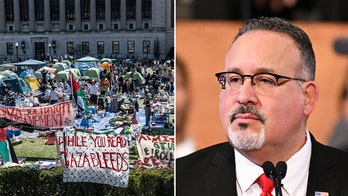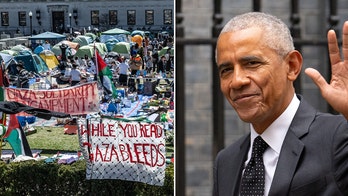Iran on Saturday reportedly released Washington Post reporter Jason Rezaian and three other dual-national prisoners.
Iranian state television said four dual-nationality prisoners were released, and a person close to Iran's judiciary said Rezaian was among them.
The announcement comes as the International Atomic Energy Agency certifies as early as Saturday that Iran, as part of a landmark deal, has fulfilled its commitments to curb its development of a nuclear weapon in exchange for world powers returning $100 billion in frozen assets.
Multiple sources confirmed to Fox News that American pastor Saeed Abedini is among those Tehran is releasing. And Marine Amir Hekmati is reportedly one of the others being released, in exchange for seven Iranians being held in U.S. prisons.
Secretary of State John Kerry is meeting in Vienna with Iranian Foreign Minister Mohammad Javad Zarif and the five other world leader officials involved in the accord.
The Iranian report did not identify the prisoners, and U.S. officials would not immediately confirm the announcement. But they had indicated a prisoner deal would be separate from Saturday's expected "implementation" of the nuclear pact.
"We’re delighted this day has finally arrived,” said Jay
Sekulow, chief counsel of the American Center for Law and Justice, which represents the Abedini family. "Pastor Saeed should never been imprisoned in the first place.
Abedini's wife, Naghmeh Abedini, said through the group, "This has been an answer to prayer. "Thank the millions of people who have stood with us in prayer during this most difficult time.”
The Washington Post said it could not confirm Rezaian’s release and that it has no information about a change in his case.
It was unclear who is the fourth person being released. State TV reported it was Siamak Namazi, the son of a politician from the era of the shah, while the official IRNA news agency said it was Nosratollah Khosravi. The different accounts could not be reconciled immediately.
The prisoner exchange and expected implementation of the nuclear deal and sanctions relief, caps a week of intense U.S.-Iran diplomacy that took an unexpected turn on Tuesday with the detention by Iran of 10 U.S. Navy sailors and their two boats in the Persian Gulf.
They were released in less than 24 hours after Kerry intervened with Zarif in multiple telephone calls that administration officials hailed as a channel of communication opened because of the nuclear negotiations.
Certification by the IAEA would allow Iran to immediately recoup some $100 billion in assets frozen overseas. The benefits of new oil, trade and financial opportunities from suspended sanctions could prove far more valuable for Tehran in the long run.
Kris Coratti, vice president of communications and spokeswoman for The Post, said that "while we are hopeful, we have not received any official word of Jason's release."
Hekmati's lawyer, Mahmoud Alizadeh Tabatabaei, said Hekmati called him earlier Saturday from prison.
"He told me that judiciary officials have called for a meeting with him. But I've not been formally informed if he is free now," he said, adding that negotiations for the prisoners' release has been going on for the past two months.
A report by the semi-official ISNA news agency quoted a statement from the Tehran prosecutor's office as saying the inmates were freed "within the framework of exchanging prisoners." It did not elaborate.
Rezaian was born in California and holds both U.S. and Iranian citizenship. He was convicted in closed proceedings last year after being charged with espionage and related allegations. The Post and the U.S. government have denied the accusations, as has Rezaian. Rezaian was the Post's Tehran correspondent and was accredited to work in the country by the Iranian government.
Hekmati, of Flint, Michigan, was detained in August 2011 on espionage charges. Hekmati went to Iran to visit family and spend time with his ailing grandmother.
Abedini of Boise, Idaho, was detained for compromising national security, presumably because of Christian proselytizing, in September 2012. He was sentenced in 2013 to 8 years in prison.
“We are grateful to the members of Congress on both sides of the aisle who tirelessly advocated for the release of Pastor Abedini," said Tony Perkins, head of the Family Research Council. "Congress and the American people clearly made the difference
in engaging the Obama administration to step up pressure on the Iranian government."
Namazi is an Iranian-American businessman who advocated better ties between Iran and the U.S.
Separately, Robert Levinson disappeared in Iran in 2007 while working for the CIA on an unapproved intelligence mission. American officials are unsure if the former FBI agent is even still alive. Iranian officials deny knowing where he is. Levinson traveled to Kish island and checked into hotel, purportedly investigating cigarette smuggling. He met U.S. fugitive Dawud Salahuddin, the last man known to see him.
The CIA family paid Levinson's family over $2 million and some staffers lost their jobs over his unauthorized work. A proof of life video surfaced in 2011, saying he was held by a group. His family received photos that year, too, of Levinson bearded, shackled, wearing orange jumpsuit and holding signs in broken English. He has seven children. He suffers from diabetes and high blood pressure.
The Obama administration has said the Americans came up in every conversation with the Iranians.
The Associated Press contributed to this reports.




